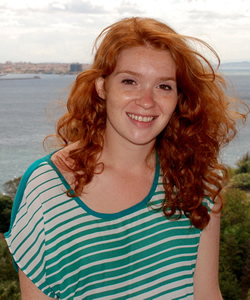As I joined my Turkish host family for a family dinner during the Kurban Bayramı, the Feast of Sacrifice, I had no idea what to expect. I knew that yes, this Muslim holiday honors Abraham’s willingness to sacrifice his son and God’s last-minute provision of a lamb to sacrifice instead, and that yes, the gentle "baas" I heard coming all week from my neighbor’s backyard were only echoes of the millions of lambs around the Muslim world awaiting sacrifice. So when I squeezed into the back seat of my family’s Honda Civic, wide-eyed and more than a little anxious, and was greeted with the harmless question “Do you like pot roast?” I had to take a minute, collect my jaw from my lap, and sit back as the shame seeped in.
I felt ashamed because despite spending two months in this wonderful country, despite taking top-notch classes on Islam, veiling, and Turkish history, and despite the innumerable Muslim friends I have made on this journey, I still harbored some of the subconscious stereotypes about Islam ingrained into many Americans. Those fears and misconceptions, subdued but not silenced over the past few weeks, still weighed on my interactions with my family. It brought me back to the weeks preceding my departure to Turkey and the questions my friends and family asked me.
“Will you have to wear a headscarf?”
“Only in mosques, and I’m actually not allowed to wear one inside universities or government buildings.”*
“What about all those protests in June? Isn’t it like Egypt over there? Will you be safe?”
“No, it is not Egypt. I will be fine.”
“I didn’t know you spoke Arabic!?”
“Turks speak Turkish.”
Things took a turn for the worse when my host aunt asked me, as part of the friendly but long Q&A session that took place after dinner, what Americans think of Turkey. I had to sheepishly and tactfully break the news that until this June, Americans didn’t really think of Turkey, and that for most of the summer, it was mentioned in the same breath as Egypt. They took the news well, understanding general American ignorance and the tendency of the media to latch on to any story featuring an authoritarian Muslim leader, but I couldn’t help but notice the momentary lapse in their smiles.
In case you were wondering, Turks are better informed about the United States. So well informed, in fact, that when my extended host family (all twenty of them) learned that I hail from the great state of Texas, the first words out of their mouths were (thankfully) not “Ted Cruz” or “George Bush,” but “John Wayne!” My jaw dropped for the second time that night as I listened to them launch into a ten-minute discussion about Westerns I had never ever seen. Even as the evening progressed, I continued to hear bits of Turkish interspersed with words I knew all too well: cowboy, horses, shoot out. Later that night, after everyone had gone home, I checked my phone and saw that a picture of me sitting with the family had been uploaded to my host sister’s Instagram, complete with the hashtag “#texaslıLindsay” (best translated as “Texan Lindsay”). How bizarre, I thought to myself before drifting off to sleep, to hear the same words I had heard from so many New Jersey prep schoolers during my first weeks of college (“You don’t look like you’re from Texas”) once again, but this time in a beach town on the Mediterranean coast of Turkey.
I have come to realize that the only way to combat these stereotypes is through cultural exchange. Reform of the sensationalist media is a nice long-term goal, but in the meantime, trying to increase the interpersonal connections between members of these two incredible nations is the best strategy for combating these sometimes amusing, sometimes dangerous prejudices. Those connections make people real, not stereotypes. And if the recent souring of Turkey-US relations continues, what with the Washington Post’s allegations that Turkey leaked information about Israeli operations to Iran and the recent purchase of a Chinese missile defense system by Turkey, a few more light-hearted conversations about American Westerns and Turkish pot roast might be exactly what the doctor orders.
___________________________________
*This statement, while true at the time, is now false as of the October 9 decision.

